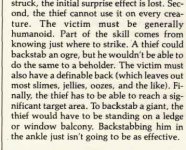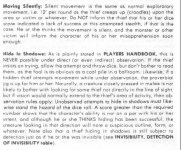But you get extra rules that change the parameters (like on a bunch of things) in the 1e DMG. Page 19:
"Back Stabbing: Opponents aware of the thief will be able to negate the attack form. Certain creatures (otyughs, slimes, molds, etc.) either negate surprise or have no definable “back”, thus negating this ability."
Yeah, this is where the trouble starts, I think. That word 'aware.' It boils down to interpretations. Personally I think being on a combatant's rear flank is enough to constitute that lack of awareness. Especially if the front flank is occupied by a burly tank wailing on said figure with a sword.
I think the phrase 'will be able to negate' is also often taken as an absolute, where I prefer to interpret it as a
possible. This is stuff you can leave to circumstance and dice etc. Let's say the thief is on the target's rear, no surprise, no hiding, he's just in the right place for that sweet, sweet backstab. Initiative is rolled, and the enemy wins initiative. Knowing this guy is on the back, the combatant elects to 'negate the attack form' by repositioning and turning to face the thief, or putting him on his shield flank etc. before the thief attacks.... But if the thief had won initiative he could backstab (at +2, also negating Dex and shield) because the other didn't have time to react and thus negate the form.
If the thief HAS surprise, that's a different kettle of fish. Not only can our poor opponent not willingly negate the form as he's most certainly unaware of the thief, but the thief is now +4 (also negating dex and shield) to strike. Unless your DM is being a real jerk and saying that 1 segment of surprise only counts as 'partial surprise' which means the target is 'aware' and therefore negates backstab...

... and I wouldn't put it past some DMs. (Thankfully I have never seen that situation yet)
For anyone who thinks that just turning their back on someone isn't enough to classify as 'unware,' I refer you to any parent of young children who has turned their back on said child(ren) for 'only a moment.'

But that's 1st ed. On the topic of 2e, and staying within printed 2e parameters - it doesn't have to be too much different. 2e does require surprise (if I'm remembering correctly) and btb you can't get a backstab by just being on the rear without surprise. But if you use surprise as the main metric for a backstab, it opens things up immensely. A thief who has failed his relevant stealth roll STILL has that chance to achieve surprise and thus backstab, merely a reduced one.
Also when Hide in Shadows explicitly calls out you can't actually Hide in total darkness always threw me for a loop. Also, since the DM is directed to make these rolls in secret, it's hard to tell exactly why your attempts failed, just that they did.
Nothing wrong with them thinking they've made it even when they failed. They aren't supposed to know they failed, they are just following through on their chosen action. And if you use the surprise metric, it may yet be a success. As DM you can make the surprise check in front of the players, and that's when the success or failure of the attempt becomes relevant. You don't even need to tell the player whether or not their roll went their way, the surprise roll will do the talking for you.
As for 'why' they failed, it doesn't matter so much. Only that dice indicated that they did, and the chance to surprise wasn't enhanced. As DM you can make up whatever justification you want within the context. A successfull HS or MS roll may still fail because the surprise roll didn't pan out even with the modifiers, or a failed roll succeeds because the surprise roll went their way. Either way it makes the attempts worthwhile..
In some cases you can even let the players make their own MS or HS rolls if the surprise check is going to be immediate anyway, and explain the metric to them so they understand it. A good way for players to see the inner workings of the process and that failure isn't the end of the world.
PLAYER: "I want to sneak up behind him with my dagger"
DM: "Okay, I'll let you roll this one, roll Move silently."
PLAYER: "26%! My MS is 25%, I guess he hears me?"
DM: "Not necessarily, I'll roll surprise. d10. He doesn't notice you if it's 1-3. (rolls 3). That means he's surprised."
PLAYER: "So I can backstab?"
DM: "Yep, roll to strike."


